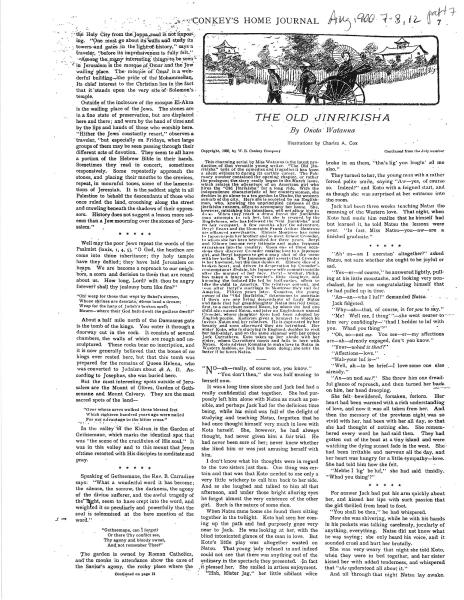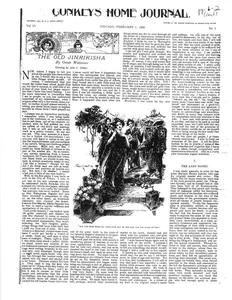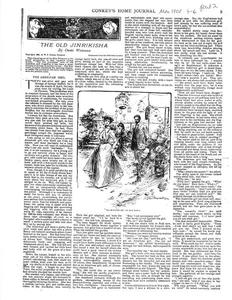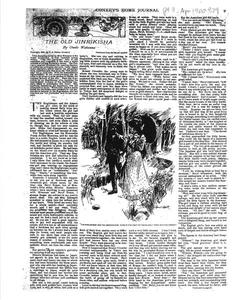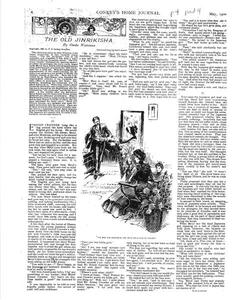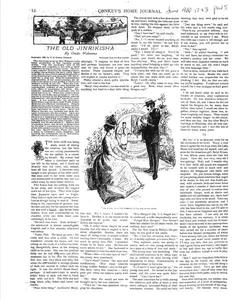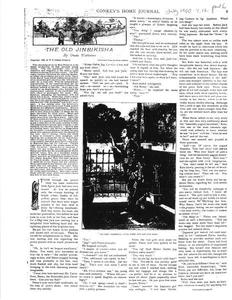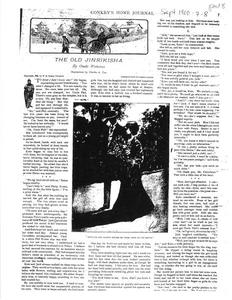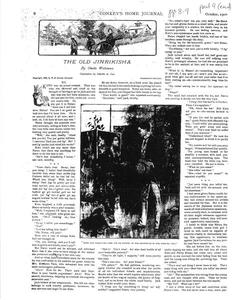VIII. (continued)
“No—-ah—-really, of course not, you know.”
“You don’t, then,” she was half musing to herself now.
It was a long time since she and Jack had had a really confidential chat together. She had purposely left him alone with Natsu as much as possible, and perhaps Jack had, for the delicious time being, while his mind was full of the delight of studying and teaching Natsu, forgotten that he had once thought himself very much in love with Koto herself. She, however, he had always thought, had never given him a fair trial. He had never been sure of her; never knew whether she liked him or was just amusing herself with him.
I don’t know what his thoughts were in regard to the two sisters just then. One thing was certain, and that was that Koto needed to use only a very little witchery to call him back to her side. And so she laughed and talked to him all that afternoon, and under those bright, alluring eyes he forgot almost the very existence of the other girl. Such is the nature of some men.
When Natsu came home she found them sitting together in the twilight. Koto had seen her coming up the path and had purposely gone very near to Jack. He was looking at her with the blind intoxicated glance of the man in love. But Koto’s little play was altogether wasted on Natsu. That young lady refused to and indeed could not see that there was anything out of the ordinary in the spectacle they presented. In fact, it pleased her. She smiled in artless enjoyment.
“Hah, Mister Jag,” her little sibilant voice broke in on them, “tha’s lig’ you loogin’ ad me also.”
They turned to her, the young man with a rather forced polite smile, saying “Aw—-yes, of course so. Indeed?” and Koto with a feigned start, and as though she was surprised at her entrance into the room.
Jack had been three weeks teaching Natsu the meaning of the Western love. That night, when Koto had made him realize that he himself had but learned it, he told Natsu the lessons were over. “In fact, Miss Natsu—-you—-aw—-are a finished graduate.”
“Ah! an—-an I unerstan’ altogether?” asked Natsu, not sure whether she ought to be joyful or sad.
“Yes—-er—-of course,” he answered lightly, pulling at his little moustache, and looking very nonchalant, for he was congratulating himself that he had pulled up in time.
“An—-an—-who I luf?” demanded Natsu.
Jack fidgeted.
“Why—-ah—-that, of course, is for you to say.”
“Me? Well me, I thing’”—-she went nearer to him very confidingly—-“thad I bedder to luf with you. Whad you thing’?”
“Oh, no—-not me. You see—-er—-my affections are—-ah—-already engaged, don’t you know.”
“Your—-whad is thad?”
“Affections—-love.”
“Hah—-your luf is—-”
“Well, ah—-to be brief—-I love some one else already.”
“An—-an nod me?” She threw him one dreadful glance of reproach, and then turned her back on him, her head drooping.
She felt bewildered, forsaken, forlorn. Her heart had been warmed with a rich understanding of love, and now it was all taken from her. And then the memory of the previous night was so vivid with her, had been with her all day, so that she had thought of nothing else. She remembered every word he had said then. They had gotten out of the boat at a tiny island and were watching the dying sunset fade in the west. She had been irritable and nervous all the day, and her heart was hungry for a little sympathy—-love. She had told him how she felt.
“Mebbe I lig’ be luf,” she had said timidly. “Whad you thing’?”
For answer Jack had put his arm quickly about her, and kissed her lips with such passion that the girl thrilled from head to foot.
“You shall be, then,” he had whispered.
Now she was shivering, while he with his hands in his pockets was talking carelessly, jocularly of anything, everything. Natsu did not know what he was saying; she only heard his voice, and it sounded cruel and hurt her brutally. She was very weary that night she told Koto, when they were in bed together, and her sister kissed her with added tenderness, and whispered that “she understood all about it.”
And all through that night Natsu lay awake.
8 Her thoughts were not altogether of Jack. They were confused--and she was thinking more of this love itself, rather than the man. She felt as if she had found something she had been long seeking, but that, alas! that something pained and hurt her. Thereafter never would she know rest without that love in her life, that strange Western love, made up of sweet words, tender glances, and touches that thrill, and that which is unknown to the Japanese, kisses and caresses.
The first real trouble of her life had come to her, and she was like a little child lost in the dark and crying vainly for the light, the illusive, delicious, deceitful light.
When Komatsu Taro came the next day Koto gave him warning. Her quick woman’s wit and understanding took in the situation and state of the girl’s mind at once, for she had lived with Natsu long enough to know of the manner in which she had been brought up, with an inexorable law always to suppress the feelings and emotions. Love, as she had now learned it, had come as a revelation to her, and she was of that nature to find vent now for all the suppressed longings in her heart.
“Now don’t tell her in words yet that you love her,” Koto said, “Only--only-—just let her feel it—-understand it.” She looked at him critically. “Are you Westernized enough for that?”
“Alas! yes,” said Komatsu Taro, enigmatically.
She was sitting all alone in the little room, looking out of the window and the sun poured all its wealth on her. Her chin rested between her two little hands, and she was dreaming—-of love perhaps. When she lifted her eyes to Taro, they made him sick with jealous pain, for he understood the thoughts were not for him.
“Of whom do you think, ane-san?” he asked her, sitting down beside her, closer than a Japanese usually would.
“Of no one,” she answered softly in Japanese.
“And do you never think of me, ane-san?” he asked somewhat sadly. “You are never absent from my thoughts.”
“Yes,” she told him, “she thought of him very often.”
He drifted quietly into the subject that absorbed her.
“And you like this—-this love?” she asked him, bewildered surprise in her eyes.
“Yes; why not I?”
“Oh, you are Japanese.”
“And you—-are you not also Japanese?”
“But I have learned the ways of the west-ocean people.”
“And I—-have I not lived among them?” He went still nearer to her. “Ane-san,” he said very gently, “this love is not foreign to Japan, little one. It is all about us always. We know it, feel it, and are happy in it. It is the secret of the general happiness here in Japan. These Westerners teach us nothing new, only that they would have us cease suppressing our feelings. That we regard the etiquette of our class in talking not of this love previous to marriage is lamentable in some ways, lamentable where one learns the lesson unconsciously, perhaps, from a stranger—-a foreign barbarian. You are tired, ane-san. The little heart is tired. Rest against me.”
His words were so tender, so serious and manly. Even I, who had learned to love the girl, not only for her ancestor’s sake but for herself, could have shaken her for her lack of understanding. She did not respond to him, but answered instead thus.
“Yes, augustness. I am weary, but—-but—-” she rose, looking somewhat frightened at the ardor of his glance, for never before had Komatsu Taro laid bare his heart so plainly- -“but I will go to my sister, and find rest perhaps with her.”
Komatsu Taro grew cold and frigid under these words. He bowed low in strict Japanese form as she passed out of the room.
She went to her sister and showed her her little hands.
“He too hol’ them,” she said.
“That was nice. Didn’t you like him to do that?”
“I—-I dunno,” said Natsu. “I also lig’ that omble Jag’ Cuthers hol’ me my hands thad sof’.”
“Oh, he does that to every girl—-any girl that’ll let him.”
“Hah! An’ Komatsu Taro also do thad at aeny girl thad led him?”
“No—-you know he doesn’t. Why don’t you love him, Natsu? He’s awfully nice. I’ve changed my mind altogether about your not marrying him. I’d love to have him for a brother-in-law. I declare I’m almost in love with him myself.”
“You!” It made Natsu laugh at the idea. “Well, I thing thad Komatsu Taro nod goin’ ter luf with you.”
“Of course not. He is madly in love with you. Any one can see it.”
“Me?-—he luf me! Well I can nod see thad. Why he nod hol’ me my han’s always so sof’?—-why he nod hol’ me—-jus’ me altogether, and kees me—-lig’—-lig’ thad Omble Jag Cuthers? He telling me thad thad is thad luf.”
“P’raps he will.”
“He! Komatsu Taro!”
“Yes; would you like him to?”
Natsu hung her head shyly. She was confused. She could not imagine Komatsu holding her close and kissing her. She sighed.
“Alas, he nod onderstan’ to amberace.”
It was Koto’s turn to laugh.
“You know, Natsu, embraces, and kisses, and caresses don’t always prove love. They generally accompany it—-but they aren’t love. You’ve got it all mixed up. I’m sure I don’t know how to explain it to you, either. Don’t know that I understand it altogether myself.” She pinched her sister’s cheek. “Just give His Excellency Komatsu Taro a chance to ‘amberace’ you, and then you’ll see!”
She left Natsu all alone, to think not of the Honorable Jack Carruthers, but of Taro and the possibility of him making love to her in the Western way. The idea thrilled Natsu in spite of the impossibility of it.
“What—-Komatsu Taro!—-the polite, the circumspect, the cold!”
But her vagrant thoughts would stray to him, and every little tender act she had ever known in connection with him she recalled to mind, from the time they had first met and had smiled in each other’s eyes. She had thought him then an extraordinarily bold lover because he had told her of her beauty. After the betrothal, however, he had been so careful in deportment toward her, and in obeying the etiquette and rules of the high class. Ah! she was glad that perhaps after all he did love her. True, he had never told her so. But did her clever sister not say—-that that was not proof. Natsu had always thought he desired her for a bride on account of her ancestors and maybe because of her beauty. Love from him also had not entered into her calculations. She had not thought of it even in those days. She had entered into the betrothal herself mostly because his wealth and high standing dazzled her, and because her relatives were so delighted at it. She went to sleep that night with a smile on her lips.
But next day Komatsu Taro sent back the betrothal presents she had made him, and the shock was such that she almost staggered as she carried them to her sister. You see, it meant that he offered to release her. Natsu thought it also meant that he had ceased to care for her. Her world was slipping from under her feet.
“Look,” she said faintly; “thad was mistake—-he does nod luf with me.” And just then, one of the servants put her head into the room and announced that Komatsu Taro was below; that he wished the presents back; he had regretted, in fact, he had come himself for them. Koto pushed Natsu out of the room.
“Go down to him, Natsu—-quick! He needs you.”
“Ah! I think maybe you don’t love me?” she said pitifully, when she was before him. Komatsu Taro smiled. Maybe he understood. He held his arms out a moment, and then drew her into them, just as Jack Carruthers had done, and he too held her close and kissed her.
Natsu quivered. She was clinging unconsciously to him, letting his kisses reach her lips. Her little heart was charged with wonderment, mysterious delight, for were not the caresses of Komatsu Taro even more to her than those of anyone in all the world? It was that she had wanted, this Western manifestation of love, once felt and understood, ever after a need, a crying necessity.
“Will you love me, little Natsu-san?” said Komatsu Taro, “or has the heart already gone to—-” He released her a moment.
The girl was breathless, radiant. She put herself back into his arms.
“No! no! no!” she said,
12 “I did not understand. I—-ah, Taro-sama, it is you I love— forever.”
IX.
Komatsu Taro and Natsu were married in the month of August. The fields were burning with a vivid glory of natane
1 and azalea blossoms, and the sun touched their wild crimson and yellow till they seemed to throb with life in their magnificent splendor.
Jack Carruthers was invited and attended the wedding, for Natsu had told Komatsu Taro in great confidence that she thought “there was much love between him and her honorable sister.”
I was very happy that day, for more than one reason.
One morning, about a week before the wedding took place, and as Taro, Natsu, Koto and Jack sat at the door, chatting merrily together, for they were all great friends now, I saw a cyclist come riding leisurely toward the house. He alighted at the garden gate, pushed his cap back on his head, and consulted the number of the house.
“It must be some one from the hotel,” said Koto, as she went half way down the garden walk.
“Does—-Miss Koto Crowder live here?”
I had heard that voice assuredly before, and now was puzzling my old head to know where and when I had seen him. He was good to look at, with his fine wiry figure and keen clever bronzed face.
“I am Miss Crowder,” quoth Koto with grave dignity.
His sharp eyes were taking the girl in, and as she spoke, they suddenly softened and melted into a smile of winning tenderness.
Have you ever noticed how those clever clean-shaven faces with stern critical eyes can become positively changed and made to look almost boyish when they laugh or smile? So it was with this man. His smile was good to see, and I had known but one man who had smiled thus.
“Please open the gate,” he said briskly; “I would like to kiss you!”
“Sir!” began Koto indignantly, blushing beautifully all the same.
“Nonsense!”—-he was still smiling—-“I am your-—er—-papa—- Phil Evans. Didn’t you expect me? and don’t you know me?”
“Oh, oh!” said Koto, and opened the gate with excited hands.
But when he took the two little outstretched hands he satisfied himself by kissing them only, for you see, he was not facing the little girl he had last seen, but a beautiful, tall young woman.
